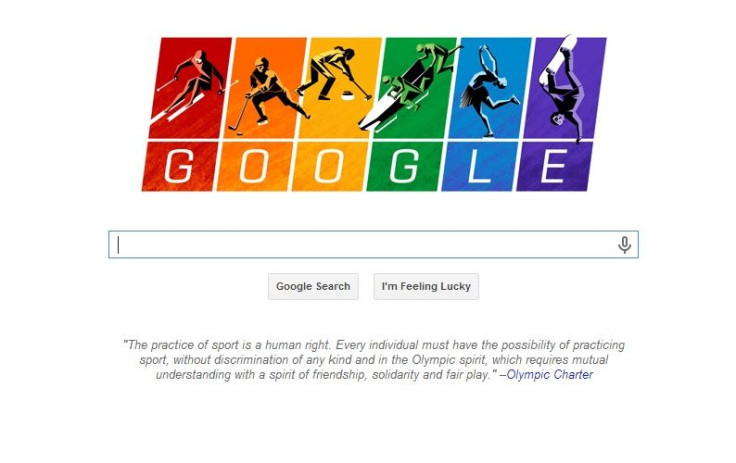Sochi Olympics Themed Google Doodle Subtly Supports Gay Rights

Google is known for its interesting topical click-through banners, called Google Doodles, that turn the company logo into homages of famous people, places or events. In the past, the doodles have celebrated Martin Luther King Jr., Nikola Tesla, and the 30th anniversary of Pac-Man. On rare occasion, Google makes the doodle into a soapbox, and today was one of those times. Friday’s doodle takes the Google name, puts it on a rainbow background adorned with different Olympic sports, and quotes the Olympic Charter, in a subtle attack on Russian anti-gay laws at the 2014 Sochi Olympics.
"The practice of sport is a human right. Every individual must have the possibility of practicing sport, without discrimination of any kind and in the Olympic spirit, which requires mutual understanding with a spirit of friendship, solidarity and fair play." – Olympic Charter
Google has been an outspoken supporter of gay rights since the Palo Alto, Calif., company joined the fight against California’s controversial Prop. 8, which banned gay marriage in the Golden State. However, Google declined to comment about Friday’s doodle, stating that they wanted the banner to speak for itself.
The doodle went live late Thursday afternoon, several hours before the traditional change at midnight, Eastern Time. Google does not enjoy the same popularity in Russia as it does in the United States, but the rainbow doodle was live on both Google.com and Google.ru.
With the doodle, Google joins the ranks of companies and activists speaking out against anti-gay laws in Russia. Official Olympic sponsors AT&T, Chobani and DeVry University issued statements Thursday against the gay propaganda laws passed last year. Russian President Vladimir Putin has defended the laws, stating that they are not designed against homosexuals but rather to protect children.
Sochi Mayor Anatoly Pakhomov made statements on Jan. 27 that he believes there are no homosexuals in his city. "It is not accepted here in the Caucasus where we live," Pakhomov said on BBC’s Panorama. "We do not have them in our city." The games officially start Feb. 7 and run until Feb. 23.
© Copyright IBTimes 2024. All rights reserved.











